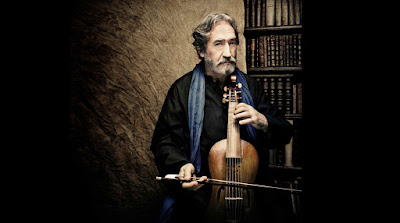Sweeping over a thousand
years of complex and culturally rich history, Jordi Savall and his performers
offered an enthralling and magisterial act of musical imagination at the
Library of Congress on Saturday. (Molina Visual)
By Simon Chin
Near the end of a
triumphant concert Saturday, Catalan early-music legend Jordi Savall boasted
that the singers and instrumentalists on the overflowing stage at the Library
of Congress hailed from 40 countries. This multinational cast was only fitting
for Savall’s ambitious program: a musical tour d’horizon of the Republic of
Venice, whose influence stretched throughout the Mediterranean world.
Sweeping over a thousand
years of complex and culturally rich history, the evening was an enthralling
and magisterial act of musical imagination.As a conductor and viola da gamba player, Savall has specialized in music from the Middle Ages to the Baroque era, a period that coincides with the life of this city-state, which was also known as the Most Serene Republic of Venice.
The thrill of a Savall concert is always a sense of discovery, and over the course of two-dozen short pieces, Savall and his three magnificent ensembles and his guest artists created a transportive narrative out of unfamiliar music. The performances, deeply informed by scholarship but always fresh, had all of Savall’s hallmarks: richness of color, rhythmic proportion and a joyous sense of spontaneity.
Part of the evening was devoted to spotlighting the far-flung reaches of Venetian influence. The Armenian duduk, a woodwind flute, had a hauntingly antique lyricism in Haig Sarikouyoumdjian’s improvisations. Hakan Güngör offered his own extravagant improvisations on the kanun, a Turkish zither, as an introduction to a tongue-in-cheek arrangement of Mozart’s “Turkish Rondo” for the larger ensemble.
Savall did not shy away from the more problematic aspects of history, including the crusading ideology of troubadour Macabru’s “Pax! In nomine Domini.” The evening’s high point came in a riveting performance of Monteverdi’s “Il Combattimento di Tancredi e Clorinda,” a dramatic madrigal about a battle between a Christian knight and a Muslim soldier. Baritone Furio Zanasi offered spellbinding narration, evoking the story’s heroism, tragedy and redemption through conversión.
https://www.washingtonpost.com/entertainment/music/jordi-savalls-fresh-take-on-ancient-rich-sounds-of-a-serene-italian-city-state/2017/02/05/0b6f658c-ebd3-11e6-a100-fdaaf400369a_story.html?utm_term=.6b6f3794d1dc

No hay comentarios:
Publicar un comentario